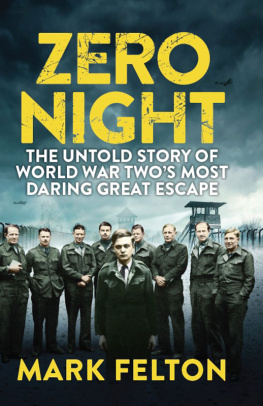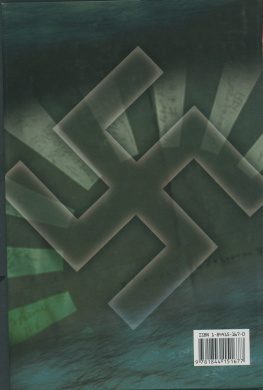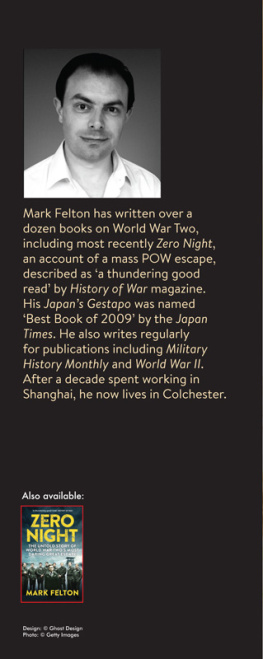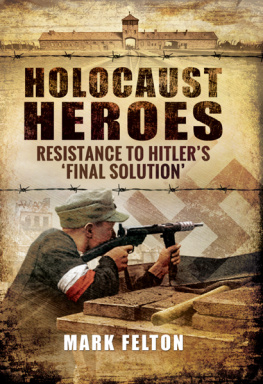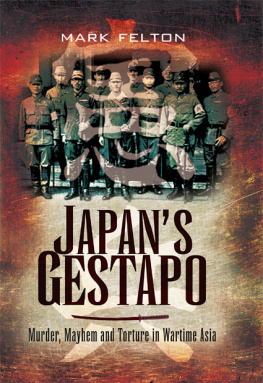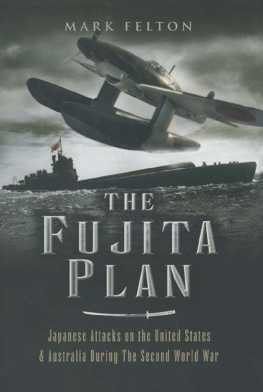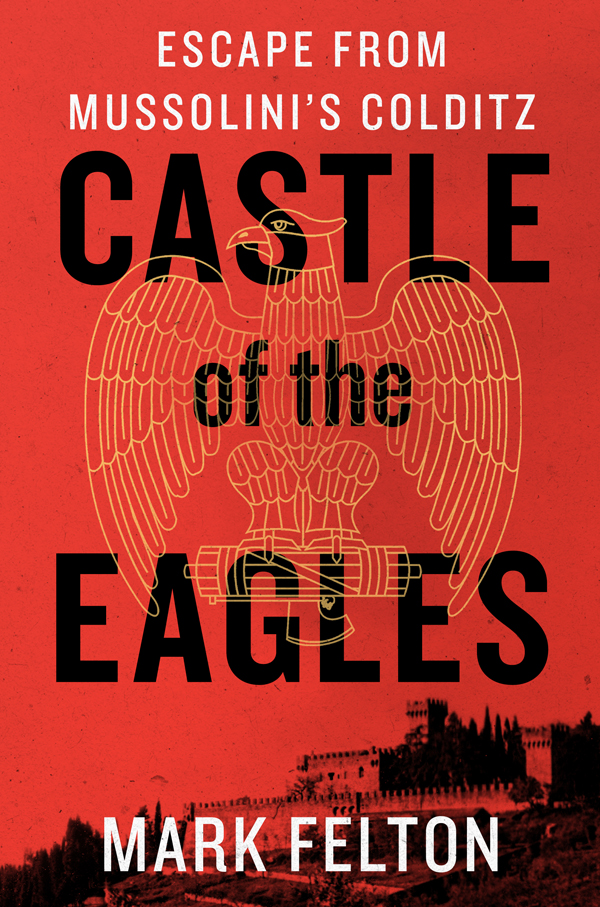Contents
Guide

The author and publisher have provided this e-book to you for your personal use only. You may not make this e-book publicly available in any way. Copyright infringement is against the law. If you believe the copy of this e-book you are reading infringes on the authors copyright, please notify the publisher at: us.macmillanusa.com/piracy.
To Fang Fang with love
Most of the dialogue sequences in this book come from the veterans themselves, from written sources, diaries or spoken interviews. I have at times changed the tense to make it more immediate. Occasionally, where only basic descriptions of what happened exist, I have recreated small sections of dialogue, attempting to remain true to the characters and their manners of speech.
The short, wiry man with the grey military moustache, known to everyone simply as Dick, sat slightly uncomfortably between two companions on a stone bench that had been warmed by the bright Tuscan sun. He wore a plain grey civilian suit and on his back was a bulky homemade rucksack that looked fit to burst. Stuck in the waistband of his trousers was a peculiar wedge-shaped block of wood with a metal hook protruding from its narrowest side. The terrace where the three men sat was pleasant, stretching along the western side of the castles central keep, and actually consisted of a lower and upper terrace enclosed by an eight-foot-high, thick stone perimeter wall, the top of which was crenellated with medieval battlements. The prisoners used the lower terrace for exercise while the guards watched them easily from the upper terrace, any danger of fraternising neatly eliminated.
The castle, built of grey stone, sat imperiously atop a high rocky hill near the village of Fiesole, five miles from the Renaissance splendours of Florence. It was a gloomy Neo-Gothic reconstructed medieval fortress, the slopes of its lofty perch planted with cypress, pines and shrubs.
Beyond the huge wall was a sheer drop of some 30 feet to the solid bedrock below, upon which the great castle had been constructed many centuries before. Two tall battlemented towers rose up at the castles northern end, overlooking the main gate and road down to the nearby village, a smattering of tiled roofs and little fields huddled at the foot of the hill. The views from the Castles terrace were stunning rolling green hills that stretched away to Florence. On a good day one could see the golden dome of the Basilica di Santa Maria del Fiore shimmering in the sun like a precious jewel.
Dicks heart was racing. He was waiting for a window of opportunity that would be measured in just a handful of seconds. That was all the time he had to make his daring bid for freedom. It was risky to attempt such a thing in broad daylight, but he had no choice. At night Dick and his fellow prisoners were confined to their rooms in another part of the castle and denied access to the terrace.
Tuscany was hot and sultry in late July 1942, and Dick sweated inside his suit as he waited for the signal to go. His keen blue eyes carefully watched as his comrades moved into their positions to assist his escape.
Suddenly the signal was given. Dick didnt hesitate. He stood up on the bench, facing the wall, raised his arms above his head and stiffened his legs. His comrades on either side took hold of his legs and, as they had practised so many times before, launched Dick skywards. Dick stretched his arms up until his fingertips found the bottom of the guards walkway and then he pulled with all his might, his comrades pushing on the soles of his feet until he was out of reach. With a supreme effort Dick fought to gain the platform, his short legs pedalling in the air as his arms took the strain. With panic rising like a wave inside of him, 53-year-old Lieutenant-General Sir Richard OConnor, the hero who had defeated the Italians in Africa and taken 130,000 prisoners into the bargain, gritted his teeth and pulled for all he was worth. One of the unlikeliest escapers of the Second World War was about to try one of the most daring escapes in the history of war.
After nine months as a member of his staff, when we left England I admired and respected Air Marshal Boyd. After two and a half years of prison life with him, living in the same house, often in the same room, I admired and respected him a hundred times more. I knew him then to be a great and simple man.
Flight Lieutenant John Leeming
John Leeming cursed loudly as his shoulder connected painfully with one of the Wellington bombers internal struts, his stomach lurching as the stricken plane pitched and rolled alarmingly through the air as it headed for the earth. The wind screamed like a typhoon through a large and jagged hole in the Wellingtons floor, one of several caused by cannon shells from the swarm of Italian fighters that had suddenly pounced on them without warning. Leeming kicked at a heavy grey steel strongbox with one of his long legs, edging it towards the lip of the hole until, with a final push of his boot, the box flew out of the aircraft, plummeting towards the Mediterranean far below. One more box remained, and Leeming, dressed in his blue RAF officers uniform with pilots wings above the left breast pocket, his legs aching from his awkward position on the planes floor, began to kick at it wildly until it followed the other boxes out through the hole. Then Leeming lay on the floor for a few seconds, listening to the roar of the dying engines as the wind blew everything that wasnt secured around the Wellingtons interior like a mini tornado. Ive just thrown away 250,000, thought Leeming, shaking his head in silent disbelief. A quarter of a million of pounds sent to the bottom of the sea! he muttered aloud. In Leemings opinion, the war had suddenly taken a dramatically strange turn for the worse.
Brace for impact! came Squadron Leader Norman Samuels frantic yell from the cockpit. Shes going in hard! Leeming was instantly jerked out of his private reverie, rolling on to his stomach and grabbing hold of anything solid-looking that would support him. He glanced behind him and saw his boss, Air Marshal Owen Tudor Boyd, a short, broad-chested, and powerfully built man with short greying hair and a neat moustache, doing likewise, his normally genial face set with a determined grimace. Boyd caught his eye and mouthed something, but Leeming couldnt hear what it was above the racket of the whining, guttering engines and the ceaseless wind. Leeming glanced back at the hole through which he had just deposited the cash boxes. The azure of the sea had been replaced by green rolling hills and fields. Sicily, muttered Leeming to himself. The Wellington was now very low. Leeming closed his eyes and awaited the end.
* * *
A strange quietness followed the terrific violence of the crash landing. Leeming lay on his side in the broken fuselage, his hands still grimly gripping a spar. The air was dusty and there was a ticking noise coming from one of the engines as it cooled. Then Air Marshal Boyd, Leeming and the four crewmen began to stir, groaning and occasionally crying out in pain from their injuries. Leeming dragged himself out of the fuselage with the others. His arm hurt like hell.
Once outside, Leeming surveyed the Wellington. The plane was a complete wreck: one of its huge wings had broken off, its nose was smashed in, and the big propeller blades had been bent back on themselves by the force of the impact. For several hundred feet behind the Wellington the Sicilian landscape had been gouged and churned up by the crash landing. Leeming narrowed his eyes against the glare of the sun, which was warm on his smoke-blackened face. Boyd slowly stood and walked, slightly unsteadily, around to the cockpit where he began fumbling in his pockets, pulling out some papers and his cigarette lighter. Leeming soon realised that the Air Marshal was trying to set fire to the plane. It was a vital task, considering what Boyd had been carrying aboard among his personal kit. His private papers would comprise an intelligence treasure trove if they were to fall into the hands of the enemy. They, along with the plane, had to be thoroughly destroyed before the Italians arrived to investigate and take the Britons prisoner.


